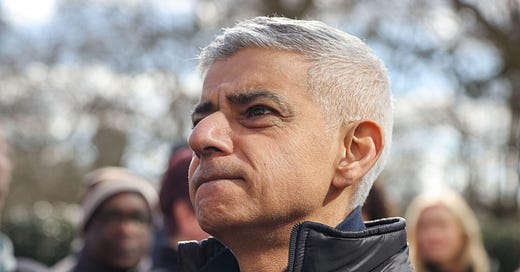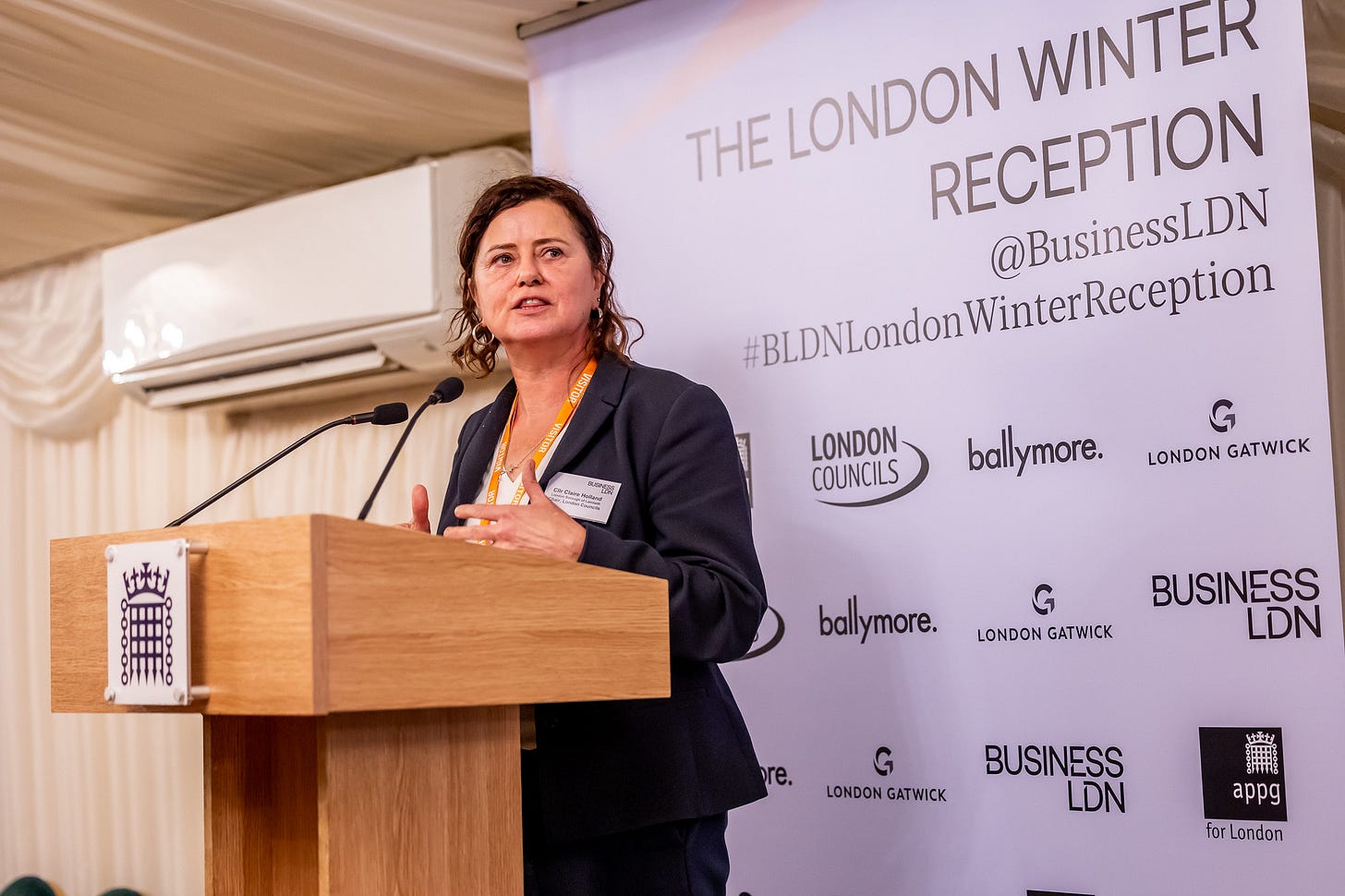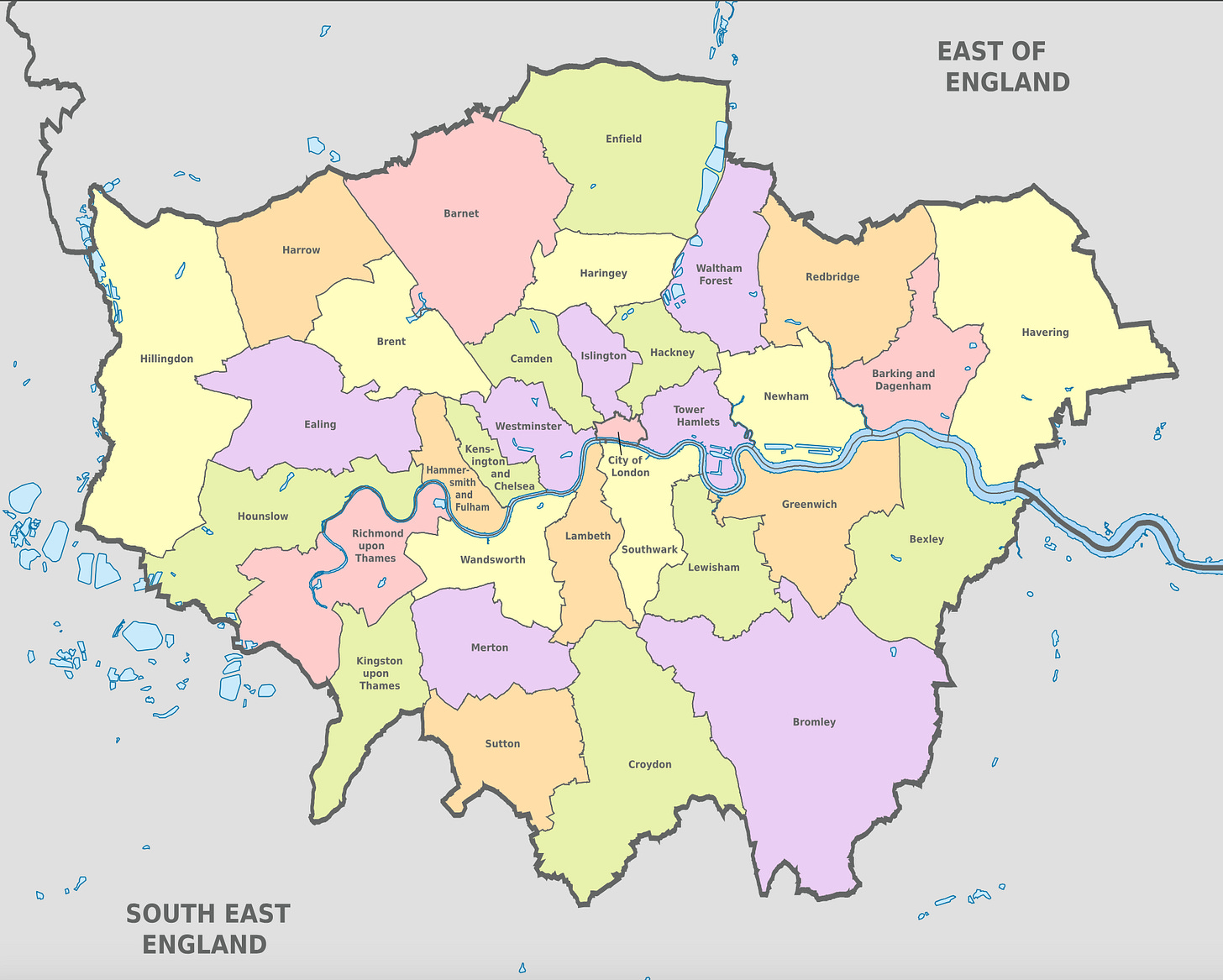The plan to make Sadiq Khan share power in London
Exclusive: London's councils want a "radical" change that could curtail the mayor's power — by following the lead of Andy Burnham in Greater Manchester.
For the last twenty five years the mayor of London has been seen as the undisputed leader of the capital. This has allowed Ken Livingstone, Boris Johnson, and Sadiq Khan to shape the city in their image with their own pet projects, whether it’s the congestion charge, a cablecar, or ULEZ.
But right now the mayor’s dominance is quietly under threat — and it’s a debate that most of the capital’s residents aren’t even aware is taking place.
Today, the leaders of the capital’s 32 local boroughs are going public in London Centric with their demand to officially share power with the mayor, in the hope that the central government sits up and takes notice.
Every single council leader in the capital — whether Labour, Conservative, Liberal Democrat, or independent — is asking for a formal say in how the mayor makes decisions, arguing the current system is “holding London back”.
Their plan, set out below, would be the biggest change to how London is governed since the job of mayor was created back in 2000. It would place limits on the power of Khan and his successors, forcing the mayor to seek cross-party consensus, while handing local borough leaders a potential veto on the mayor’s actions.
Claire Holland, the Labour leader of Lambeth council, warned that the current mayoral system leaves “all power in the capital concentrated in the hands of one person”, meaning the system relies on the “goodwill” of the mayor for collaboration on strategic all-London issues.
Holland said their plan is not just about Khan’s remaining time in office but also about what happens in “the next 30 years”. She said the existing structure lacks “resilience” if a radical maverick politician were to become mayor of London: “All that power would be concentrated in the hands of one person, who might have very different views to the rest of the boroughs and the government.”
She said London should instead learn from the model used in Greater Manchester, where mayor Andy Burnham is required by law to work closely with local councils.
Burnham described this model to London Centric as being the equivalent of being captain of a football team, where he is the leader but has to bring the rest of the group with him.
Holland, who has a second job leading the London Councils organisation representing local government in the capital, instead likened her colleagues’ proposal to being in a band.
Khan and his successors would remain the face of the capital on an international and national stage. But local borough leaders, from all political parties, would be formally involved in making decisions behind the scenes, Holland said: “He can carry on being the lead man but everybody in the band needs to play their part in order to produce the number one single.”
Scroll down to read the details on how it might work.
London Centric is a reader-funded publication that aims to bring you original, interesting stories that explain how the capital really works, while avoiding clickbait. If you haven’t subscribed already, please consider supporting our work.
The Greater London councils: How your local borough leader wants to keep the mayor in check.
When Keir Starmer invited local news outlets to Downing Street on Monday night he emphasised that he wants his government to “have the courage” to devolve power out of Whitehall and into local communities across England.
One of the biggest challenges his government faces is how to do this in the capital, which is central to the success of the entire British economy and home to nine million people but has a devolution deal that was designed in the 1990s.
Will Sadiq Khan secure more authority and money, creating an increasingly powerful mayoralty that places more control in one elected individual — or will Khan and his successors have to share power with the capital’s other local politicians?
Claire Holland is making the case for the second option. In an interview with London Centric she set out how she wants the mayor’s job to be transformed into the figurehead of a new form of London government which has more in common with Greater Manchester’s model of devolution.
Under the proposal twelve council leaders, elected in proportion with the success of their political parties, would be given permanent seats alongside the mayor on a ‘Combined Board’ that would make many major decisions on the future of London. The mayor would be required to win a majority vote on key strategic and funding issues, requiring Khan or his successor to consult and win over those twelve individuals before pushing through relevant proposals.
This would follow the model being rolled-out in almost every other part of England, where regional mayors are forced to work with local councils of all political backgrounds and seek consensus.
Holland said change is a necessity: “If we don't take this opportunity now, we will be the only [council] leaders in the country without a seat at the table. And we believe that that's a real risk for London and Londoners.”
“However you dress it up, it’s power-sharing”
Tony Travers, a professor at the London School of Economics who specialises in London, described the proposal as a “radical departure” from London’s status quo that would "tilt power away from City Hall towards a collective of town halls”.
He suggested the plan reflected frustration with the mayor at a council level, especially since 21 of the 32 boroughs are controlled by Labour and there is a Labour mayor and a Labour government: “It’s clear that the boroughs feel that City Hall decision-making is less than optimal from the boroughs’ point of view. From the mayor’s point of view, anything that doesn’t give the mayor 100% of the decision-making power, which is what the mayor has had for 25 years, is a very radical change. However you dress it up, it’s power sharing.”
Part of the tension revolves around how the public perceives the different roles of the mayor and the local councils. Khan’s team have been open about wanting to have more control over spending in the capital, suggesting the job is lacking powers when compared to the equivalent position in other global cities such as New York and Paris.
This gap between power and public perception means that Khan often gets criticism over issues that are outside his control and credit for things that he had little involvement with.
At the same time, the local councils feel the public don’t understand the grunt work they do emptying bins, dealing with planning applications, filling potholes, dealing with safeguarding issues, and housing homeless Londoners. They believe they sometimes know better than City Hall when it comes to distributing money to their communities, growing local economies, and efficiently delivering services on the ground to people who need them.
“I never thought I would quote Andy Burnham as a friend of London”
In a collective statement seen by London Centric the 32 council leaders say that the current mayoral system was “designed in a different century, for a different era, and is in urgent need of an update”. They want the government’s proposed English devolution reforms to include them in decision-making for London. The leaders warn that the current system is “holding London back”, harming economic growth in the capital and making it harder to improve the lives of ordinary Londoners.
They don’t propose abolishing the existing Great London Assembly, which is elected to scrutinise the mayor,
Holland again referenced Andy Burnham, in which he suggested the model used elsewhere in Greater Manchester would benefit the capital: “I never thought I would quote Andy Burnham as a friend of London but he very much recognises that having the leaders around the table makes for better decision making. You'll get swifter decisions and we won't have to negotiate on a case-by-case basis.”
The bigger question is whether the government and Khan will back the proposal. The decision lies with deputy prime minister Angela Rayner and local government minister Jim McMahon, who are leading the government’s plans on devolution in England. Their proposals are expected to be made public in the coming months.
Holland insisted the intention is not to undermine Khan: “We've spoken to Sadiq's team a lot. They are very much aware of our position as London boroughs and very much aware that we're pushing for this because we think it is the best for London. This was a government that was elected on change and I think we have to embrace that for London.”








I'm afraid this is a dreadful idea - surely a recipe for huge delay and protracted battles over even the smallest decisions. London is already an outlier compared to other mega cities (as you point out) in terms of restricted executive power. See the example of Oxford St pedestrianisation where the presence of one or two marginal wards in a tight council end up forcing delay to progressive urban upgrade - imagine if every council has a veto power. We would have never had ULEZ and I'd still be slowly contracting lung cancer (even faster) on my cycle to work..!
So London Councils want to return to pork barrel politics and scrap ULEZ (an example of “better” decision making in Manchester)?